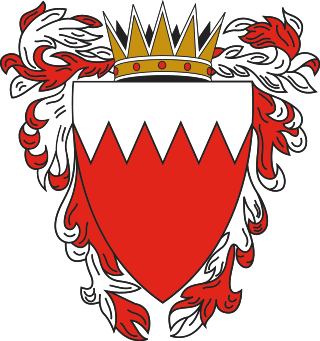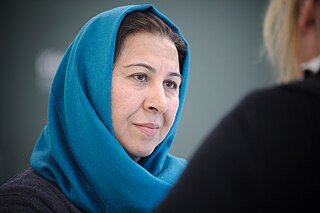
The Revolutionary Association of the Women of Afghanistan (RAWA) is a women's organization based in Kabul, Afghanistan, that promotes women's rights and secular democracy. It was founded in 1977 by Meena Keshwar Kamal, an Afghan student activist who was assassinated in February 1987 for her political activities. The group, which supports non-violent strategies, had its initial office in Kabul, Afghanistan, but then moved to Pakistan in the early 1980s.

The Taliban, which also refers to itself by its state name, the Islamic Emirate of Afghanistan, is an Afghan militant movement with an ideology comprising elements of Pashtun nationalism and the Deobandi movement of Islamic fundamentalism. It ruled approximately 75% of the country from 1996 to 2001, before it was overthrown by an American invasion. It recaptured Kabul in August 2021 following the departure of coalition forces, after 20 years of Taliban insurgency, and now controls all the country. The Taliban government is not recognized by any country and has been internationally condemned for restricting human rights, including for women to work and have an education.

This article on the history of Afghanistan covers the period from the fall of the Najibullah government in 1992 to the end of the international military presence in Afghanistan.

Freedom of religion in Afghanistan changed during the Islamic Republic installed in 2002 following a U.S.-led invasion that displaced the former Taliban government.

Grand AyatollahMuhammad Asif Mohseni was an Afghan Twelver Shi'a Marja', widely considered to have been the most powerful in Afghanistan. He was the founder of the Islamic Movement of Afghanistan.

The Northern Alliance, officially known as the United Islamic National Front for the Salvation of Afghanistan, was a military alliance of groups that operated between early 1992 and 2001 following the dissolution of the Soviet Union. At that time, many non-Pashtun Northerners originally with the Republic of Afghanistan led by Mohammad Najibullah became disaffected with Pashtun Khalqist Afghan Army officers holding control over non-Pashtun militias in the North. Defectors such as Rashid Dostum and Abdul Momim allied with Ahmad Shah Massoud and Ali Mazari forming the Northern Alliance. The alliance's capture of Mazar-i-Sharif and more importantly the supplies kept there crippled the Afghan military and began the end of Najibullah's government. Following the collapse of Najibullah's government the Alliance would fall with a Second Civil War breaking out however following the Islamic Emirate of Afghanistan's (Taliban) takeover of Kabul, The United Front was reassembled.

Lesbian, gay, bisexual, and transgender (LGBT) people in the Islamic Emirate of Afghanistan face severe challenges not experienced by non-LGBT residents. Afghan members of the LGBT community are forced to keep their gender identity and sexual orientation secret, in fear of violence and the death penalty. The religious nature of the country has limited any opportunity for public discussion, with any mention of homosexuality and related terms deemed taboo.
Human rights in Afghanistan are severely restricted, especially since Taliban's takeover of Kabul in August 2021. Women's rights and freedom are severely restricted as they are banned from most public spaces and employment. Afghanistan is the only country in the world to ban education for women over the age of eleven. Taliban's policies towards women are usually termed as gender apartheid. Minority groups such as Hazaras face persecution and eviction from their lands. Authorities have used physical violence, raids, arbitrary arrests and detention, torture, enforced disappearances of activists and political opponents.

The situation of human rights in Pakistan is complex as a result of the country's diversity, large population, its status as a developing country and a sovereign Islamic democracy with a mixture of both Islamic and secular law.
Gender apartheid is the economic and social sexual discrimination against individuals because of their gender or sex. It is a system enforced by using either physical or legal practices to relegate individuals to subordinate positions. Feminist scholar Phyllis Chesler, professor of psychology and women's studies, defines the phenomenon as "practices which condemn girls and women to a separate and subordinate sub-existence and which turn boys and men into the permanent guardians of their female relatives' chastity". Instances of gender apartheid lead not only to the social and economic disempowerment of individuals, but can also result in severe physical harm.

Bahrain's record on human rights has been described by Human Rights Watch as "dismal", and having "deteriorated sharply in the latter half of 2010". Their subsequent report in 2020 noted that the human rights situation in the country had not improved.

Women's rights in Afghanistan have oscillated back and forth depending on the time period as well as the regime in power. After King Amanullah Khan's attempts to modernize the country in the 1920s, women officially gained equality under the 1964 Constitution. However, these rights were taken away in the 1990s through different temporary rulers such as the mujahideen and the Taliban during the Afghan civil war. During the first Taliban regime (1996–2001), women had very little to no freedom, specifically in terms of civil liberties. When the Taliban was overthrown by the United States following the September 11 attacks, women's rights gradually improved under the presidential Islamic Republic of Afghanistan. Women were de jure equal to men under the 2004 Constitution.

The Afghan conflict refers to the series of events that have kept Afghanistan in a near-continuous state of armed conflict since the 1970s. Early instability followed the collapse of the Kingdom of Afghanistan in the largely non-violent 1973 coup d'état, which deposed Afghan monarch Mohammad Zahir Shah in absentia, ending his 40-year-long reign. With the concurrent establishment of the Republic of Afghanistan, headed by Mohammad Daoud Khan, the country's relatively peaceful and stable period in modern history came to an end. However, all-out fighting did not erupt until after 1978, when the Saur Revolution violently overthrew Khan's government and established the Democratic Republic of Afghanistan. Subsequent unrest over the radical reforms that were being pushed by the then-ruling People's Democratic Party of Afghanistan (PDPA) led to unprecedented violence, prompting a large-scale pro-PDPA military intervention by the Soviet Union in 1979. In the ensuing Soviet–Afghan War, the anti-Soviet Afghan mujahideen received extensive support from Pakistan, the United States, and Saudi Arabia in a joint covert effort that was dubbed Operation Cyclone.

The Hazaras have long been the subjects of persecution in Afghanistan. The Hazaras are mostly from Afghanistan, primarily from the central regions of Afghanistan, known as Hazarajat. Significant communities of Hazara people also live in Quetta, Pakistan and in Mashad, Iran, as part of the Hazara and Afghan diasporas.
Gulnaz is an Afghan woman and rape victim. She was raped by her cousin's husband in 2009 and became pregnant. She was then charged with zina, a crime in Afghanistan. She was initially sentenced to two years in jail, which was later raised to twelve, and she gave birth to a daughter in jail.

Events from the year 2012 in Afghanistan.
Rape is a major issue in Afghanistan. A number of human rights organizations have criticized the country's rape laws and their enforcement.

Shinkai Zahine Karokhail is an Afghan politician and rights activist, focusing mainly on the political representation of women and the protection of vulnerable children. She was the Afghan ambassador to Canada.
Sabrina Saqeb is an Afghan politician who served as a member of parliament from 2005 to 2010. She received media attention in 2009 when she participated in and helped organize protests against a law passed by Afghan president Hamid Karzai pertaining to Shiite personal law. Among other things, the law required women to have sex with their husbands at a certain frequency, and required women to get permission before leaving their house. After completing her tenure in parliament, Saqeb co-founded an organization called the "Research Institute for Women, Peace and Security," and became an advocate for Women's rights.

The Islamic Republic of Afghanistan was a presidential republic that ruled Afghanistan from 2004 to 2021. The state was established to replace the Afghan interim (2001–2002) and transitional (2002–2004) administrations, which were formed after the 2001 United States invasion of Afghanistan that had toppled the partially recognized Taliban-ruled Islamic Emirate of Afghanistan. However, on 15 August 2021, the country was recaptured by the Taliban, which marked the end of the 2001–2021 war, the longest war in US history. This led to the overthrow of the Islamic Republic, led by President Ashraf Ghani, and the reinstatement of the Islamic Emirate under the control of the Taliban. While the United Nations still recognizes the Islamic Republic as the legitimate government of Afghanistan, this toppled regime controls no portion of the country today, nor does it operate in exile; it effectively no longer exists. The Islamic Emirate is the de facto ruling government. The US–Taliban deal, signed on 29 February 2020 in Qatar, was one of the critical events that caused the collapse of the Afghan National Security Forces (ANSF). Following the deal, the US dramatically reduced the number of air attacks and deprived the ANSF of a critical edge in fighting the Taliban insurgency, leading to the Taliban takeover of Kabul.















